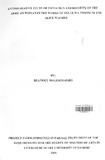| dc.description.abstract | This study is a comparative analysis of initiation and the identity of the African woman as portrayed in the two novels, The River Between and Possessing the Secret of Joy by Ngugi Wa Thiongo and Alice Walker respectively. These two authors play out clitoridectomy a s a rite 0 f transition and incorporation of the African woman in African society. However, the contextual backgrounds that inform the setting upon which Ngugi and Walker narrate on circumcision of women leads to different conclusions about the practice.
Ngugi, writes from the Kikuyu community in Kenya depicts the initiation of women through clitoridectomy as the defining moment of an African woman's identity. Kikuyu society is in the midst of colonial transition Christian Missionaries in their proselytizing activities are dead set against the practice of circumcision of women as barbaric and inhuman. Ngugi creates paradoxical character, Muthoni, a female christian convertee who insists on being circumcised. She viewed clitoridectomy a s a key instance that defined the identity of her womanhood. Unfortunately, she dies shortly from complications which arose while undergoing her initiation. But prior to passing on, Muthoni was a proud woman who felt she had made a transitional mark into womanhood of her society.
Walker on the other hand is an African-American who explores into the phenomenon of clitoridectomy as the height of male inhumanity and cruelty towards women. Its raison de tre is the control of women's sexuality by men.
Tashi, the heroine in Possessing the Secret of Joy undergoes initiation in order to gain her identity as an African woman. But the course of events results in a series of bodily and mental discomforts thereafter. She encounters menstrual difficulties, sexual penetration problems by her husband and pain in the process. Life simply becomes unbearable for Tashi until she relocates to America.
In America, Tashi undergoes sexual therapy, rediscovers herself and looks back to clitoridectomy as a male practice meant to control women's sexuality. This moment of revelation engages Tashi mentally to a level where she becomes a new woman in search of sexual liberation. Towards this end she kills her initiator as a symbol of the death of those who cruelly mutilate and enslave women's sexuality to men. Simultaneously however she feels freed as a born again woman able to appreciate and enjoy her sexuality.
In a comparative sense, this study discerns the nuances of gender in the discourse in clitoridectomy and the identity of the African Woman. For Ngugi, an outsider so to speak to women's inner consciousness, the death of Muthoni does not mean much as long as she having undergone initiation left the solidarity of the community intact. Her individuality as a woman and her sexuality could be sacrificed at the alter of maintenance of the male centric Kikuyu community.
Walker to the contrary, an African American woman and an insider to woman's inner feelings, brings out the excruciating pain and discomfort a woman undergoes after clitoridectomy. She narrates in detail the bodily and mental agonies of Tashi to the level where one has no choice but to condemn the practice that wrecks havoc to women's sexuality.
This study is guided by feminist literary theory and it is based on library research. | en_US |

